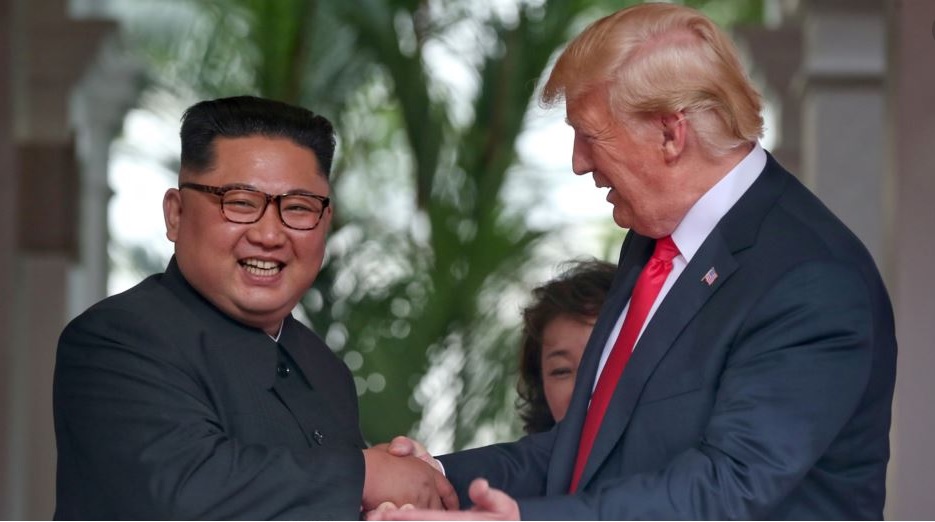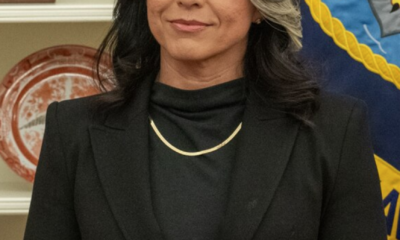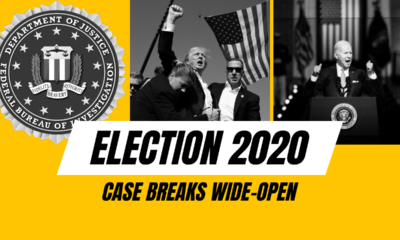Guest Columns
Harris ‘Filibusters,’ Trump ‘Weaves’ in Dueling Interviews
Harris and Trump each has a distinctive style in interviews – the filibuster and the weave, respectively. Both were on display in one day.

Asked about reparations for descendants of enslaved Americans during a radio town hall with “The Breakfast Club,” Vice President Kamala Harris said Tuesday that the issue “has to be studied.”
The Harris filibuster and the Trump weave
And then the Democrats’ 2024 presidential nominee offered a word salad of boilerplate and ephemera. She talked about growing up in a middle-class family, the importance of acknowledging the “context of history” when righting past economic inequities, and the “critically important” need to see black men “as whole human beings” who happen to be not just sons but also fathers, uncles, and grandparents.
Nearly five minutes passed.
“Two other things,” Harris continued, “and then I’ll keep going.” Replied Lenard McKelvey, the radio host better known as Charlamagne tha God, “You’re going to keep going?” She laughed, “You caught that!” He acquiesced to what he called her “filibuster.”
Meanwhile, during an interview at the Economic Club of Chicago, Donald Trump was asked about the world reserve currency. The former president replied bluntly that any nation that considered dropping the dollar would incur a “100% tariff.”
And then the Republicans’ 2024 presidential nominee subsequently bounced from topic to topic in a routine he now describes as “the weave.” He switched from first to third person while talking about how some “love Trump’s policies” but dislike the “crass” messenger, described South Carolina Sen. Lindsey Graham as “a progressive in all fairness,” and began a story about economic negotiations with France.
Nearly five minutes passed.
Bloomberg Editor-in-Chief John Micklethwait protested, “You’ve gone from the dollar to [Emmanuel] Macron.” Replied Trump, “You’ve got to be able to finish a thought” because “this is big stuff.”
Harris does not live in the moment
The pair of interviews, the first on a podcast and the second at the Economic Club, stretched for over an hour, giving insight into the stream-of-consciousness of each candidate just three weeks before Election Day. Trump’s views on tariffs are well-known. Harris’ middle-class refrain is well-worn. More than the specific answers though, Trump and Harris explained why they communicate the way they do.
When Charlamagne pressed Harris to respond to the criticism that she’s too scripted, that she too often sticks to her talking points, she replied, “That would be called discipline.” To anyone annoyed by the repetition, the vice president explained, “I would say you are welcome.”
And there is truth to the criticism: Harris is not a politician who lives in the moment, or the kind of candidate who thrives in off-the-cuff interactions. She leans on the teleprompter, often delivering the same remarks again and again. Gaffes are avoided but glitches still occur. When technical difficulties appeared to interrupt the scrolling text of her speech in Michigan this month, for instance, the vice president froze awkwardly on stage.
A lack of variety isn’t a vice, Harris maintains. Instead, she presents it as a virtue. Repetition has become something of a hallmark for her because, as she explained, audiences need to hear her views more than once to internalize them. “Yes, at my rallies, I say the same thing when I go to Detroit as I do in Philly, and as I do wherever I am,” she added.
Trump defends his style
This includes talking points on thorny questions. Asked if the Biden-Harris administration deserved “some blame” for the situation the southern border, Harris fell back on a canned explanation about how Trump helped spike a bipartisan deal. She did not mention, however, the fact some Democrats opposed the legislation or provide any context about how marquee legislation seldom gets passed during an election year. The vice president, who oversaw record high illegal immigration, instead insisted that the way to deal with a porous border would have been to overhaul “the broken immigration system.” (Biden backed legislation to do that on his first day in office, but lacked the votes for what Republicans decried as “amnesty.”)
Sitting across from the Bloomberg editor, meanwhile, Trump was not pressed into a meta-conversation about his unique communication style. Instead, he repeatedly brought it up on his own: the aforementioned “weave.”
Micklethwait stuck to policy, but the former president recently explained during a separate interview with comedian Andrew Schulz just exactly what he is doing when he abruptly switches, without explanation, between topics. Some say that he is rambling. The former president insists that his routine is “genius.”
Trump likes to punch back
“I don’t ramble if I start a story,” he said last week, “what you do is you weave things in.” This would seem to explain the extended answer on Tuesday that began with the dollar, touched on the senior senator from South Carolina, and ended with the French president. In his telling, this requires “an extraordinary memory because you have to come back to where you started.”
This has worked well for Trump in front of friendly audiences. Supporters flock to his rallies, among other reasons, precisely because their hero might say just about anything. But his schtick can fall flat when on stage against an opponent or during interviews, like the one conducted Tuesday. When the routine was interrupted and he was pressed on a specific topic – this time the national debt – Trump punched back as is his habit.
“What does The Wall Street Journal know?” he asked when pressed on their reporting about how his economic agenda would add to the debt. “They’ve been wrong about everything,” he continued before focusing his ire on Micklethwait, “and so have you, by the way, you’ve been wrong.”
One thing they agree on – they despise each other
The Harris filibuster and the Trump weave were on full display three weeks from the election. Voters will soon decide whom they trust. But one through-line exists between the two very different candidates: their shared antipathy for one another.
Harris agreed with her interlocuter when he said Trump’s vision “is about fascism,” asking, “Why can’t we just say that?” Despite all the previous talk about turning down the rhetoric, the vice president replied, “Yes, we can say that.”
Trump, meanwhile, offered his own unique insult. The former president often questions the intelligence of his successor. “By the way,” he weaved at the end of one answer about Harris, “I never thought I’d say this, she is not as smart as Biden.”
This article was originally published by RealClearPolitics and made available via RealClearWire.
Philip Wegmann is White House Correspondent for Real Clear Politics. He previously wrote for The Washington Examiner and has done investigative reporting on congressional corruption and institutional malfeasance.
-

 Accountability2 days ago
Accountability2 days agoWaste of the Day: Principal Bought Lobster with School Funds
-

 Constitution2 days ago
Constitution2 days agoTrump, Canada, and the Constitutional Problem Beneath the Bridge
-

 Executive17 hours ago
Executive17 hours agoHow Relaxed COVID-Era Rules Fueled Minnesota’s Biggest Scam
-

 Civilization16 hours ago
Civilization16 hours agoThe End of Purple States and Competitive Districts
-

 Civilization4 days ago
Civilization4 days agoThe devil is in the details
-

 Executive4 days ago
Executive4 days agoTwo New Books Bash Covid Failures
-

 Civilization3 days ago
Civilization3 days agoThe Conundrum of President Donald J. Trump
-

 Executive4 days ago
Executive4 days agoThe Israeli Lesson Democrats Ignore at Their Peril












